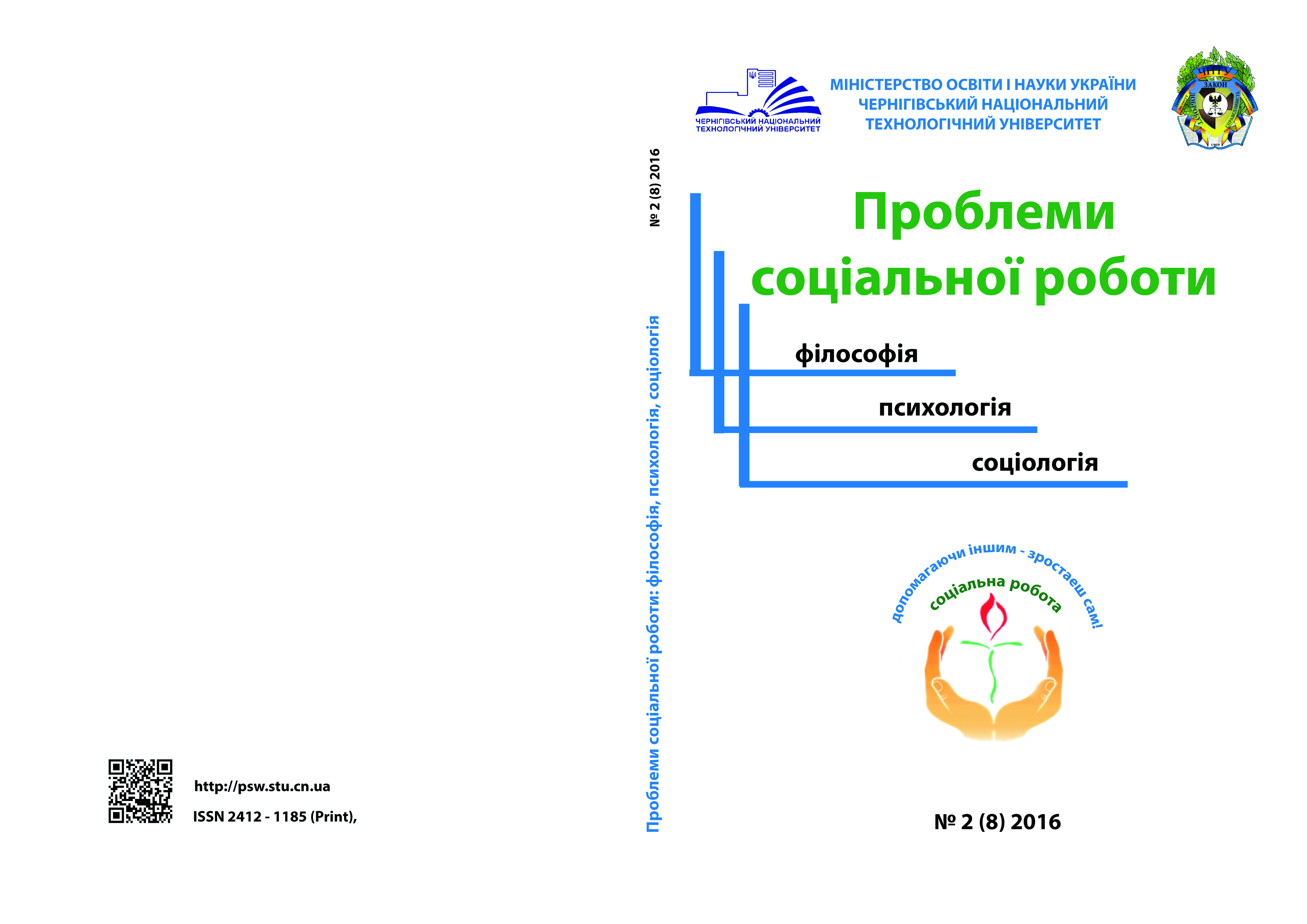LIFE STRATEGIES OF MODERN UKRAINIAN STUDENTS: CONTENT AND TYPOLOGY
Keywords:
higher education, students, life strategy, motivationAbstract
The article discusses the main features of life strategies of modern Ukrainian students. Life strategy of the person identified as the most complex phenomenon of generalized (universal) scale, which includes all other dimensions and categories that characterize human life in general and its behavior. Life strategy - a way of life organizing by the the man, the ability to bring living conditions in accordance with personality own values and individual uniqueness. At the same time life strategy – universal motivating system that encourages people to be active, to achieve their goals, to self-realization, self-understanding, self-expression etc. Life strategy is seen as a way of rational attitude to human own lives. The purpose of the strategy - mainly conscious management and design of the individual's own life by the gradual formation of the future, to build a hierarchy of meanings and purposes on the basis of certain social values. Other forms of rationalization (life plans, intentions, scenarios, etc.) are included in the strategy as a resource and the forms of embodiment (articulation) strategy. Research and conclusions are based on the author's social studies (survey) conducted in 2015-2016 at 35 faculties of 16 Ukrainian universities in all macroregions of Ukraine. Main crucial indicators are characterizing: the leading students' motivation towards learning, the factors that led to the choice the university and the faculty (specialty), awareness of the relevance of the specialty in the labor market now and in the future, the degree of independence (autonomy/dependence) in the self-determination and life choices. Attention is paid to the views of students on study and employment prospects abroad, to independent work of students to improve their skills and competencies, in particular language training etc. The author's typology of the main types of life strategies of students in connection with the appropriate understanding of the place and role of higher education: careerpragmatic (focus on success, career achievement), universal education (set to general higher education and self-realization), and adaptive-conformist (orientation to receive formal education, on the circle of interesting dialogue, etc.). In general it’s possible to say that the students are quite realistically assess theplace and role of higher education in their own destiny and in the current context of Ukrainian realities. This place is not remeasured, students generally give aware of the fact that knowledge and diplomas in a crisis of uncertainty depreciate. Installation of the high academic achievement of students is inherent in the minority. Most people do not attach much importance as a learning process, and future careers. The common can be considered instrumentalism in achieving their goals, the relative devaluation of professionalism values up to exclusion from the labor conformism, lack of development of creative abilities, etc. It is obvious that the crisis activate and nourish in young minds the value of self-preservation and basic survival, making the «background» spiritual values. and making young people hostage material aspects of life.References
Крутько, С. В. Психологічні особливості життєвих стратегій особистості / С. В. Крутько //Вісник Одеського національного університету. Психологія. – 2011. – Т. 16. - Вип. 7. – С. 126–131.
Созонтов, А. Е. Основные жизненные стратегии современных российских студентов: автореф. … канд. психол. наук: 10.00.05 «Социальная психология» / А. Е.Созонтов. – М., 2003. – 21
с.
Резник, Ю. М. Жизненные стратегии личности (опыт комплексного анализа) / Ю. М. Резник, Е. А. Смирнов. – М. : Институт человека, 2002. – 260 с.
Прудська, О. В. Дослідження індивідуальної зумовленості адаптації студентівпершокурсників до системи навчання у ВНЗ / О. В. Прудська // Психол. перспективи. – 2012. –
Вип. 19. – С. 197–207.
Опитування проводилося жовтні-квітні 2015-2016 рр. серед студентів очної форми навчання перших та четвертих курсів 35 різних факультетів. Було опитано студентів юридичних, економічних, гуманітарних, соціальних, педагогічних і технічних спеціальностей у 16-ти вищих навчальних закладах: 8 ВНЗ - центрального, 4 - південного, 3 - західного і 1 - східного макрорегіонів
України. Опитування проводилося згідно з випадковою вибіркою, було опитано 2212 респондентів шляхом анкетування. Статистична похибка не перевищує 2,8%.
Downloads
Issue
Section
License
Copyright (c) 2017 Chernihiv National University of Technologies

This work is licensed under a Creative Commons Attribution-NonCommercial 4.0 International License.
1. Політика, яка рекомендується журналам, що пропонують відкритий доступ Автори, які публікуються у цьому журналі, погоджуються з наступними умовами:- Автори залишають за собою право на авторство своєї роботи та передають журналу право першої публікації цієї роботи на умовах ліцензії Creative Commons Attribution License, котра дозволяє іншим особам вільно розповсюджувати опубліковану роботу з обов'язковим посиланням на авторів оригінальної роботи та першу публікацію роботи у цьому журналі.
- Автори мають право укладати самостійні додаткові угоди щодо неексклюзивного розповсюдження роботи у тому вигляді, в якому вона була опублікована цим журналом (наприклад, розміщувати роботу в електронному сховищі установи або публікувати у складі монографії), за умови збереження посилання на першу публікацію роботи у цьому журналі.
- Політика журналу дозволяє і заохочує розміщення авторами в мережі Інтернет (наприклад, у сховищах установ або на особистих веб-сайтах) рукопису роботи, як до подання цього рукопису до редакції, так і під час його редакційного опрацювання, оскільки це сприяє виникненню продуктивної наукової дискусії та позитивно позначається на оперативності та динаміці цитування опублікованої роботи (див. The Effect of Open Access).


